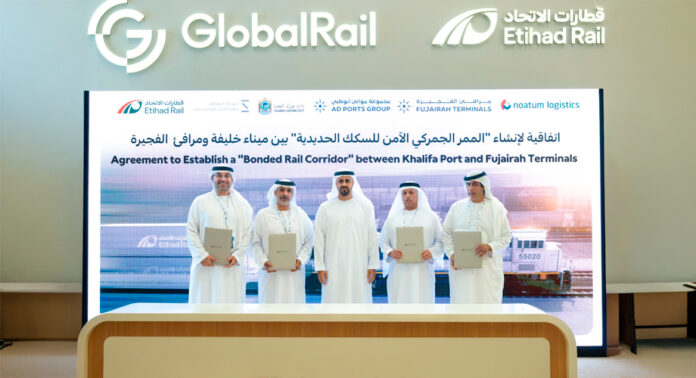
Sheikh Theyab bin Mohamed bin Zayed Al Nahyan witnessed the signing of a Memorandum of Understanding between Etihad Rail, Abu Dhabi Customs, Fujairah Customs, AD Ports Group, Fujairah Terminals, and Noatum Logistics to launch a new “Bonded Rail Corridor” connecting Khalifa Port in Abu Dhabi with Fujairah Terminals.
He highlighted the national railway’s pivotal role in boosting economic competitiveness, providing safer and more efficient transport solutions, and advancing the nation’s sustainable development vision.
Announced during the second edition of Global Rail 2025, the landmark initiative represents a strategic advancement in strengthening the efficiency, safety, and integration of rail transport operations across the UAE.
Through this collaboration, the project will facilitate seamless, safe, and sustainable goods movement by establishing a secure customs corridor linking Khalifa Port and Fujairah Terminals, along with their adjacent free zones, via the UAE’s national railway network.
It will also deliver advanced, end-to-end logistics services, ensuring efficiency from origin to destination.
The Customs Corridor will offer multiple advantages to railway customers, enabling seamless goods movement between Khalifa Port, Fujairah Terminals, and their adjacent free zones.
The corridor will reduce customs clearance times and facilitate efficient entry and exit through coordinated pre-inquiry procedures, with final customs formalities completed at both locations.
Additionally, goods transported via Etihad Rail trains will enjoy competitive advantages with priority clearance within customs systems.
The corridor will be implemented across free zones, transit shipments, exports, and domestic goods movement between the Emirates of Abu Dhabi and Fujairah.
Pilot operations for the Customs Corridor are scheduled to begin in the fourth quarter of 2025.
Ahead of the launch, Etihad Rail is collaborating closely with relevant authorities and customers to formalize cooperation frameworks, activate the full range of services and benefits for users, and establish performance monitoring mechanisms to ensure the highest standards of efficiency and quality.
Looking ahead, project partners plan to expand the Customs Corridor network to additional train stations, introducing innovative services and competitive advantages through cutting-edge technologies.





